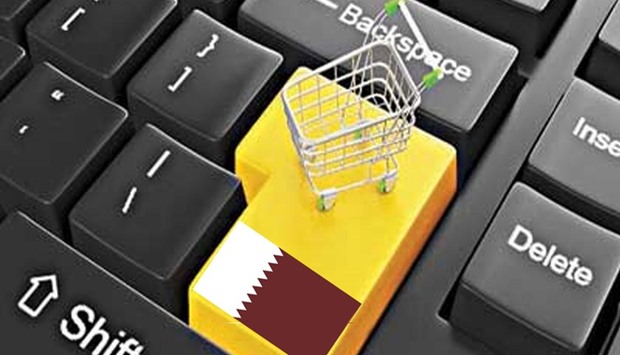According to “Qatar’s ICT Landscape 2014: Households and Individuals”, one out of five general mainstream individuals reported purchasing or placing orders for goods and services online.
The global e-commerce market is booming. The move from traditional brick-and-mortar stores to electronic commerce (e-commerce) opens up new markets and opportunities for business establishments and offers customers access to new products across geographical boundaries.
The e-commerce market size in Qatar is estimated to be QR8.44bn in 2014, with the business-to-consumer (B2C) market contributing 44% and the business-to-business (B2B) market contributing 56% (QR4.73bn).
Worldwide, the B2B market segment makes up 82% of the e-commerce.
Considering this global average and the small e-commerce market size in Qatar, the B2B market in Qatar is still in the nascent stage of development.
Lack of knowledge about offers among customers, trust and security concerns, lack of technical resources, and issues with payment methods and gateways are a few of the key factors reported by business establishments in the survey that affect the adoption of e-commerce in Qatar.
A representative of a leading bank in Qatar echoed these findings, “Security concerns are one of the key reasons preventing the adoption of online payment and e-commerce business among many users.”
E-commerce portals offer information and services from a variety of sources and help business establishments sell and purchase products or services through the Internet. These portals include features such as payment gateways and delivery mechanisms, among others.
Overall, 3% of the business establishments surveyed have implemented an e-commerce portal, with 11% of business establishments with more than 50 employees having an e-commerce portal.
Only a negligible percentage of the establishments with 1–9 employees have one. The initial setup and regular maintenance costs as well as the lower computer and Internet penetration among small businesses are considered to be the key barriers for the implementation of e-commerce portals.
When looking at it by main economic activity, the construction sector has a higher rate of e-commerce portals than other sectors, though still only at 12%.
A factor for the growth of e-commerce is the penetration of credit and debit cards. When it comes to online purchases, globally, payment through such cards is one of the most preferred payment modes along with cash on delivery and bank-to-bank transfer.
According to Payfort’s ‘The State of Payments in the Arab World 2014’, among relevant peers, Kuwait has the highest penetration of bank cards per capita in the Arab world at 97%, followed by UAE with 89% and Saudi Arabia with 46%. Qatar’s rate stands at 45%.
At the same time, credit cards were used for just 6% of total consumption (consumer spending) in Qatar for the period 2008–2012, whereas credit cards contributed 31% in the UAE, 25% in Kuwait, and 23% in Saudi Arabia. “The expected increased use of credit cards will drive the e-commerce market in the future,” the report noted.

The e-commerce market size in Qatar is estimated to be QR8.44bn in 2014, with the business-to-consumer (B2C) market contributing 44% and the business-to-business (B2B) market contributing 56% (QR4.73bn).
High information and communications technology (ICT) penetration rates among Qatar’s population indicate a “potential for growth” of the e-commerce market in the country, according to a new report by the Ministry of Transport & Communications (MOTC).

